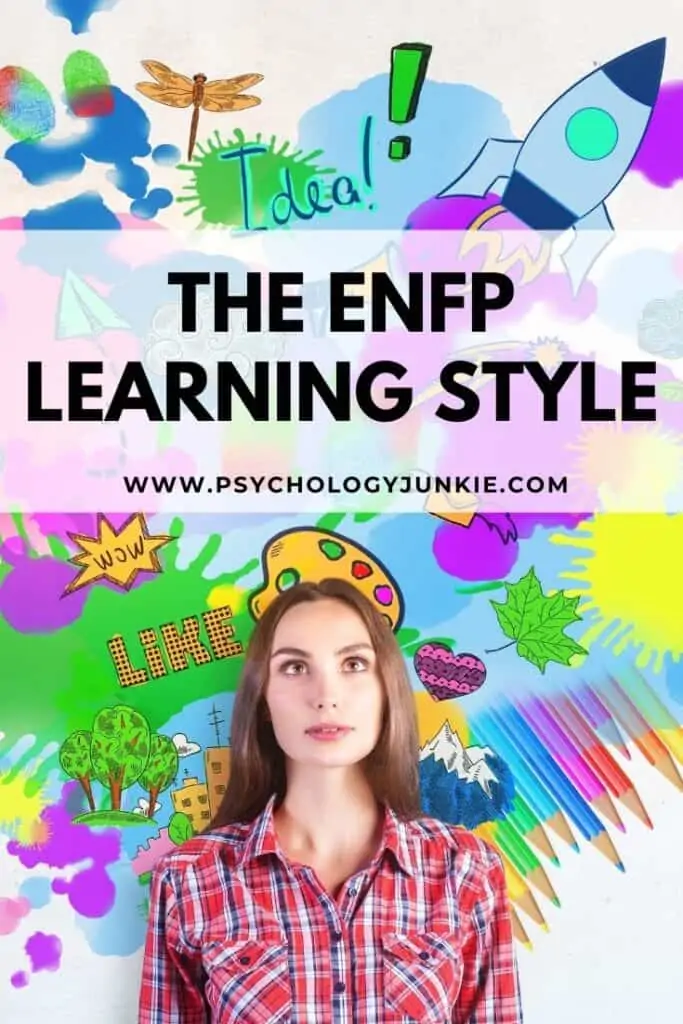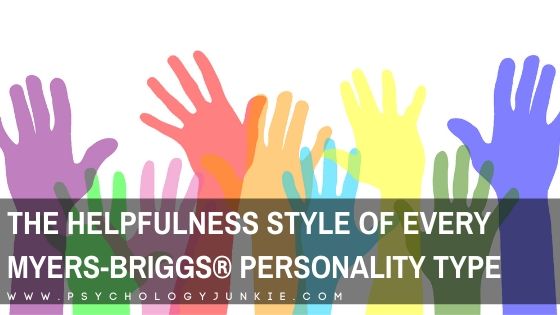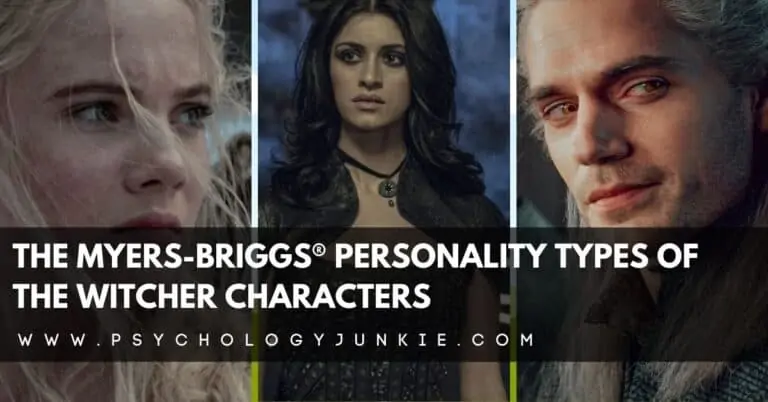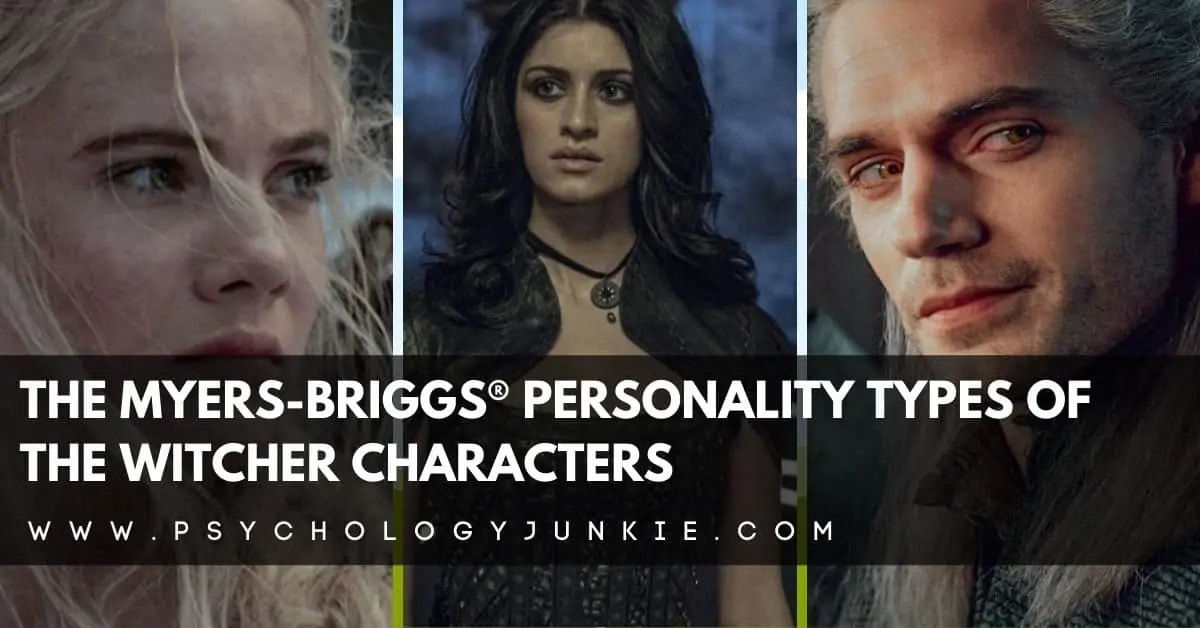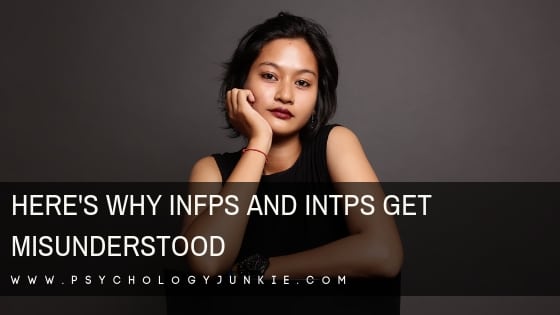The ENFP Learning Style
ENFPs are known for being the inspirers, visionaries, or champions of the type community. With their enthusiasm, imagination, and exploratory approach to life, they take on challenges and pursue possibilities.
But how do they like to learn?
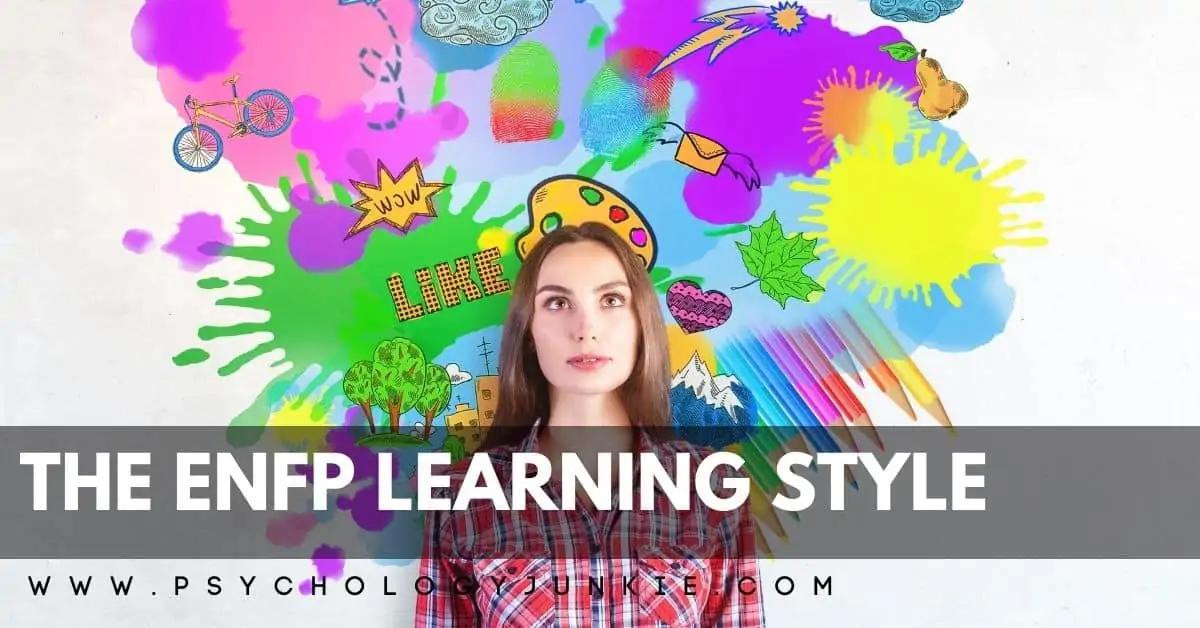
What types of teaching will most inspire them?
That’s what we’re going to be exploring in today’s article.
Not sure what your personality type is? Take our new personality questionnaire here. Or you can take the official MBTI® here.
This article contains affiliate links to books on Amazon. If you purchase one of these books, I get a small kickback that I can use to pay for hosting and the other demands of this site. I only recommend books I love.
Table of contents
Estimated reading time: 6 minutes
The ENFP Learning Style
For the ENFP, the most important aspect of learning is ensuring that their imagination is engaged. Subjects that don’t spark possibilities seem lackluster to them. They yearn for the excitement that lies in the branches of potential that an idea can spark in their mind.
Anything that engages the imagination will fascinate the ENFP. Naturally curious, they want to be everywhere, embarking on every whim, discovering every bit of information that could offer more possibilities and meaning.
Possibility-Hopping:
The mind of the ENFP is programmed to multiply possibilities, spot connections, and decipher multiple interpretations. One idea creates an explosion of other ideas, and before you know it, a discussion on photosynthesis has turned into a debate over the symbolism of fire in The Lord of the Rings. ENFPs tend to see many layers and angles at once, and seek to explore every one with enthusiastic gusto.
The ENFP Mind:
ENFPs often describe their mental world as teeming with possibilities and imaginings. Neuroscience expert Dario Nardi states that ENFPs often show a “Christmas tree” pattern in their minds. “Imagine a holiday tree decked with a myriad of flashing lights of various colors, each light a different brain region, and each color a different level of activity therein. In this state, the neocortex is active all over, and each region is of high amplitude and out-of-synch with the others. The regions are all busy doing their own thing and possibly generating a surprise result.” (Find out more in Nardi’s book, Neuroscience of Personality: Brain Savvy Insights For All Types of People)
If you ever wanted to know how a tin can is similar to the human heart, ask an ENFP. They can see connections and relationships between anything and are gifted at making random associations that others would never be able to dream up. Their mind is constantly seeking these connections, reading between the lines, and grasping abstract concepts. They often consider themselves jacks-of-all-trades, knowing a little about everything, and a lot about their particular passions and causes.
What an ENFP learns has to inspire them, spark their imagination, and align with what matters to them on a personal level. If the subject doesn’t matter to them personally and doesn’t stir their heart or imagination, they’re likely to tune out.
How ENFPs Learn Best:
Interactivity is crucial to the ENFP. They want to bounce ideas off others, get feedback, and share their enthusiasm with their peers. When it comes to a teacher-student relationship, ENFPs need to feel valued and respected. They love interactive classrooms where they can freely ask questions, pose possibilities, and collaborate. They also will enjoy studying with their friends typically much more than they’d enjoy studying in isolation.
Many young ENFPs get in trouble during school for being “distractions” or speaking too much in class. This is unfortunate, considering they often do their best thinking when they’re talking. As they speak out their thoughts their ideas become clearer and they can make much more headway on their projects. Of course, there are exceptions over time. Many ENFPs become more capable of learning alone as they reach their mid 20’s and beyond. However, in early life, being able to speak up, think out loud, and correspond is crucial to their learning process.
Conceptual Learning:
As intuitives, ENFPs naturally look towards the big picture. When they learn they want to know why the subject matters in the grand scheme of things. They also want to understand the key concepts. If teachers want to get their attention, they should explain the broad meaning and context before diving into a bunch of facts and details. Lots of linear details will mean little to the young ENFP until they know the “why” behind it.
Often ENFPs learn well through reading and writing. They love words and enjoy the picturesque landscapes they can create with them. At a young age they tend to sense the power of the written word and often make up their own stories or wile away their alone time reading novels, fantasy literature, or even poetry.
How ENFPs Study:
ENFPs have a free-flowing, exploratory approach to studying. Rather than sitting down and buckling up with a to-do list, they’re more likely to have a spontaneous flow of energy that leads them down many paths. They often start required assignments, find a related inspiration, and then wander through many different avenues of inspiration, only to “cram” at the last minute to complete a project.
Beginnings are much more exciting than endings, and ENFPs often have to work hard to keep pulling themselves back to their studies unless the subject is one they are deeply passionate about.
Many ENFPs I’ve spoken with have managed their distracted pace by keeping their phones in other rooms, setting limits on how long they’re allowed to explore other inspirations, and giving themselves little rewards for meeting milestones (e.g. Once I finish two paragraphs, I’ll listen to three of my favorite songs). ENFPs often enjoy studying with others, where they can be inventive, bounce ideas off the other person, and share their enthusiasm or find alternatives and tips and techniques.
What ENFPs Need In Order to Learn:
- A sense of inspiration and possibility
- The ability to see meanings and associations
- The freedom to read between the lines
- A sense of the big picture before the details
- A focus on general concepts more than literal details or practical facts
- If they must memorize details or facts, doing so through a sort of game, storytelling, artistry, or oral presentation
- Freedom to be creative
- Opportunities to be inventive and unique
- Work that allows them to experiment with new skills rather than repeating a lot of the same skills over and over again
- A brisk, upbeat pace
- The ability to study with a friend
- Freedom to think out loud for regular segments
- Friends to share ideas and learned material with
- Interactions with people who share similar interests
- Topics that they care deeply about
- Warm, friendly environments
- Harmonious work and studying in small-group settings
- Open exploration and discussion/brainstorming
- Freedom from a rigid structure
- The ability to stay open to new experiences and ideas
- Breaks to get up and move around
- Ability to turn work into a fun game or challenge
Read This Next:
The ENFP Ne-Te Loop: What It Is and How to Cope
24 Signs That You’re an ENFP, the Visionary Personality Type
What helps you learn best?
Are you an ENFP with some tips for fellow ENFPs? Leave a comment to help others in their journey!
Find out more about your personality type in our eBooks, Discovering You: Unlocking the Power of Personality Type, The INFJ – Understanding the Mystic, The INTJ – Understanding the Strategist, and The INFP – Understanding the Dreamer. You can also connect with me via Facebook, Instagram, or Twitter!
